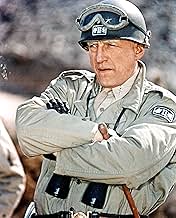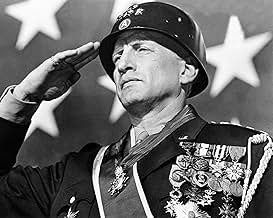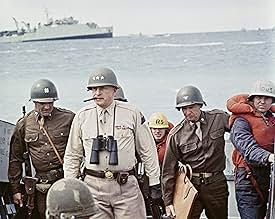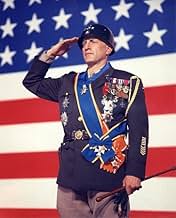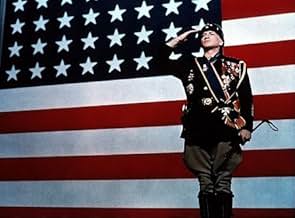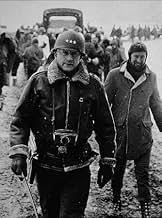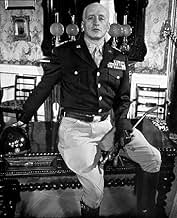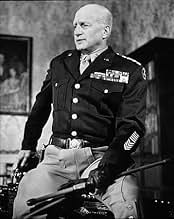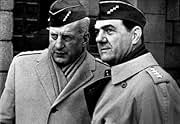Patton
- 1970
- Tous publics
- 2h 52m
The World War II phase of the career of controversial American general George S. Patton.The World War II phase of the career of controversial American general George S. Patton.The World War II phase of the career of controversial American general George S. Patton.
- Won 7 Oscars
- 25 wins & 8 nominations total
Carey Loftin
- General Bradley's Driver
- (as Cary Loftin)
Pat Zurica
- First Lieutenant Alexander Stiller
- (as Patrick J. Zurica)
Richard Münch
- Colonel General Alfred Jodl
- (as Richard Muench)
Summary
Reviewers say 'Patton' is acclaimed for George C. Scott's compelling performance as General George S. Patton, highlighting his complexity. The film is lauded for its epic scope, Franklin J. Schaffner's direction, and powerful war sequences. However, some critics find it lacking in secondary character development and note its lengthy runtime. Historical accuracy is debated, with concerns over anachronisms and creative liberties. Despite these issues, 'Patton' is recognized as a pivotal war film, offering profound insights into leadership and the intricacies of war.
Featured reviews
PATTON was truly a shock to the system when it was released. The United States was still in the thick of the Vietnam war, and the country was extremely polarized between the hawks and the doves. Then along comes Patton, with a portrayal of a rebellious General who was always being put in his place by the establishment - even though he was, of course, a major establishment figure (generals aren't usually the most liberal or progressive types). Eisenhower (unseen) and the media are portrayed as unsympathetic to the maverick Patton, who is so single-minded in his determination to defeat the Germans you have to root for him, despite his boorish behavior.
And that is why Patton works - you have an unambiguous war against and unambiguous evil - Nazi Germany. Whereas Vietnam might have been a tough conflict for even its supporters to explain, World War Two was quite simple - we were the good guys, and they WERE the bad guys. And so you COULD root for the US Army and Patton without feeling a tinge of guilt.
Also superb in the film is everyman Karl Malden as General Omar Bradley, providing the stable and workmanlike leader (and one who rises quicker in the ranks due to it) to Patton's egomaniac.
And Yes, George C. Scott delivers a career-defining performance that is one for the books. Could Brando or Telly Savalas have pulled off the role as well? I don't think so - it was just tailor made for Scott.
And that is why Patton works - you have an unambiguous war against and unambiguous evil - Nazi Germany. Whereas Vietnam might have been a tough conflict for even its supporters to explain, World War Two was quite simple - we were the good guys, and they WERE the bad guys. And so you COULD root for the US Army and Patton without feeling a tinge of guilt.
Also superb in the film is everyman Karl Malden as General Omar Bradley, providing the stable and workmanlike leader (and one who rises quicker in the ranks due to it) to Patton's egomaniac.
And Yes, George C. Scott delivers a career-defining performance that is one for the books. Could Brando or Telly Savalas have pulled off the role as well? I don't think so - it was just tailor made for Scott.
The best comment on this film was made by my father. This was the last movie he saw in a theater. He had served under Patton in WW2 and said that Scott had nailed Patton's character and mannerisms so perfectly that halfway through the opening speech, he expected Scott/Patton to look down and say, "$@%#$@, Sears, get a haircut - your hair's too &#%#$%@ long!"
. . . and it's not even about the war. There's no wall to wall action. In fact, World War II is merely the setting a backdrop so to speak and the battles are all downplayed in favor of giving the audience a glimpse into the brilliance (or insanity) of the historically significant character, Patton. From the script on up, everything plays out wonderfully to bring the famous general to life on screen, and after watching George C. Scott deliver his Oscar-worthy performance, I find it hard to believe there were a number of actors on the list above his name.
George C. Scott's performance of Patton is one I consider the greatest given of any war film. Patton is a champion for freedom while sometimes equally as much of a tyrant as the ones he's trying to put down, he's a monster and a hero, and neither he nor the filmmakers give a damn about political correctness. I found the character to be an overly harsh prick, myself, but in some strange way, very likeable and sympathetic, and when watching the movie again I don't look at the screen and say, `Hey, there's George C. Scott.' Instead it's, `Hey, there's Patton.' Not very many film characters have a personality strong enough to overtake the actor playing them. I appreciate that depth and that degree of realism, this attention to detail on the parts of Scott and Schaffner.
Schaffner surprised me by somehow managing to capture my interest on a subject matter I'd ordinarily write off as too silly (Planet of the Apes); two years later, he applied that same technical know how, craft, and intelligent storytelling towards a film whose subject appeals to me from the get go, and once again I'm impressed. There are some great war films out today; however, Schaffner's take pursued the most unique perspective in all realms, and captured my imagination with such ease . . . I can't help but come back to it over other war films.
And I have to comment on the score, which is not only one of my favorite Goldsmith scores but also one of my favorite war-film scores. Jerry Goldsmith matched point for point the brilliance of Franklin Schaffner's vision, the depth of George C. Scott's performance, and somehow managed to captured the essence of both musically. A good music score is one that tells the story of the film in its own unique voice. Goldsmith's score has such a prominent voice in the experience of Patton, that to remove it would be the equivalent of removing Schaffner's direction or George C. Scott.
Lastly, how accurate is the film? Not a clue, and even if it is completely false, I don't care. I've never been about writing history papers based on cinema experiences. All I know for certain is that Patton is a very entertaining and well balanced movie that holds up very well thirty years later, and it's a film that can be admired for its craft.
George C. Scott's performance of Patton is one I consider the greatest given of any war film. Patton is a champion for freedom while sometimes equally as much of a tyrant as the ones he's trying to put down, he's a monster and a hero, and neither he nor the filmmakers give a damn about political correctness. I found the character to be an overly harsh prick, myself, but in some strange way, very likeable and sympathetic, and when watching the movie again I don't look at the screen and say, `Hey, there's George C. Scott.' Instead it's, `Hey, there's Patton.' Not very many film characters have a personality strong enough to overtake the actor playing them. I appreciate that depth and that degree of realism, this attention to detail on the parts of Scott and Schaffner.
Schaffner surprised me by somehow managing to capture my interest on a subject matter I'd ordinarily write off as too silly (Planet of the Apes); two years later, he applied that same technical know how, craft, and intelligent storytelling towards a film whose subject appeals to me from the get go, and once again I'm impressed. There are some great war films out today; however, Schaffner's take pursued the most unique perspective in all realms, and captured my imagination with such ease . . . I can't help but come back to it over other war films.
And I have to comment on the score, which is not only one of my favorite Goldsmith scores but also one of my favorite war-film scores. Jerry Goldsmith matched point for point the brilliance of Franklin Schaffner's vision, the depth of George C. Scott's performance, and somehow managed to captured the essence of both musically. A good music score is one that tells the story of the film in its own unique voice. Goldsmith's score has such a prominent voice in the experience of Patton, that to remove it would be the equivalent of removing Schaffner's direction or George C. Scott.
Lastly, how accurate is the film? Not a clue, and even if it is completely false, I don't care. I've never been about writing history papers based on cinema experiences. All I know for certain is that Patton is a very entertaining and well balanced movie that holds up very well thirty years later, and it's a film that can be admired for its craft.
My only complaint with this film is several of the battle scenes play way too long. The first one in N. Africa, especially, is tension-less muddle. Due to the narrative focus on the affairs of the generals the battles are not very good and after are hard to follow. This is exceedingly minor in context because of not only the fog of war but history is what history is. I mention this because despite this issue I rather like this film, despite Patton (the man) being a brute and authoritarian. He was not a 20th century man. That says more about him than the 20th century.
The screenplay is, easily, the best part of the film. By the use of sarcasm and pointed barbs the film manages to place Patton the man in the proper context and despite Patton the man being pro-war make an anti-war film; it is really a very clever piece of writing that allows both hawks and doves to be really engaged with the storyline (which largely handles the history well). Best of all, this use of irony and sarcasm allows the film to show Patton as a complex, paradoxical and hypocritical figure. Patton the man loved the smell of battle but couldn't understand why fine young men had to die in war. He is a man who read his Bible every goddamn day. It is a sight to behold the mess and contradictions Patton lived by. And the screenplay effortlessly keeps the viewer orientated of what is happening in the war.
Scott is of course tailored made for the role and he gives his best career performance. Malden is also really engaging. The technical aspects give the film its proper weight. This is an exemplar of what a biopic can be.
The screenplay is, easily, the best part of the film. By the use of sarcasm and pointed barbs the film manages to place Patton the man in the proper context and despite Patton the man being pro-war make an anti-war film; it is really a very clever piece of writing that allows both hawks and doves to be really engaged with the storyline (which largely handles the history well). Best of all, this use of irony and sarcasm allows the film to show Patton as a complex, paradoxical and hypocritical figure. Patton the man loved the smell of battle but couldn't understand why fine young men had to die in war. He is a man who read his Bible every goddamn day. It is a sight to behold the mess and contradictions Patton lived by. And the screenplay effortlessly keeps the viewer orientated of what is happening in the war.
Scott is of course tailored made for the role and he gives his best career performance. Malden is also really engaging. The technical aspects give the film its proper weight. This is an exemplar of what a biopic can be.
A few years ago, I had the pleasure of reading "The Patton Papers," a collection of Gen. Patton's diary entries and letters edited by Martin Blumenson. Having seen the movie, I think that no actor has ever better captured the spirit of a man better than George C. Scott, nor has any movie better portrayed that spirit than PATTON.
Patton was a man who lived for war. World War II was the high point and culmination of his life. He didn't fight for any principles, he didn't fight to defend freedom or democracy or any abstract idea; he fought because he loved fighting. In his diaries you can read of his fear of flunking out of West Point; the prospect terrified him because he was certain that he would never be good at anything except being a general or a leader of a country.
As a leader of men, he was exceptional. His speech at the beginning of the movie is vintage Patton, an almost exact reproduction of a speech Patton actually gave to Third Army. It's tough, and no-nonsense; Patton lets you know in no uncertain terms that he is here to win, to destroy the enemy, and by God you'd better be too. I don't know if Patton actually directed traffic on the roads as he is shown doing in the movie, but it was a very Pattonish thing to do. Patton did on at least one occasion get out of his staff car and join a squad of G.I.'s in heaving a vehicle out of the mud. Try to imagine Montgomery doing that; the very thought is hilarious!
Patton's character explains his treatment of his men. To those who had been wounded fighting for him he was always kind and considerate. But to those whose minds could not stand the horrible strain that war imposed on them, he was merciless; he could not comprehend the fact that other people didn't share his love of violence for violence' sake. PATTON shows this aspect of his character very well.
Karl Malden's Omar Bradley is shown in an almost father-like role; he sees and recognizes Patton's immense talents as a general, and uses them in spite of Patton's natural ability to antagonize everybody around him. Not shown in the movie is Patton's unloveable characteristic of turning on his subordinates once they surpassed him in their careers. Patton had nothing but good to say about Bradley, until Bradley was promoted over Patton's head, whereupon Patton savaged Bradley in his diary. Patton did the same to Eisenhower.
A general can have no higher compliment than the fear and respect of his adversaries, and as PATTON demonstrates, Patton was more feared by the Germans than any other Allied general, at least on the Western front. As one German officer observes all too prophetically, "the absence of war will destroy him [Patton]." And although mankind's single greatest stroke of good fortune in the 20th century was that Russia and America never came to blows, it is still hard not to feel sorry for Patton as he desperately seeks his superiors' approval to carry the war on eastward into the Soviet Union - anything, just to have a war to fight. Patton is like an addict to a destructive drug.
Hollywood has rarely given us such a textured and human portrait of a great man: cruel, often foolish in his relations with others, rude, and psychopathically attached to violence, but brave, dedicated, and loyal. Certainly those who, like myself, have Jewish blood, or who were otherwise marked for death by the Nazi state, all owe him a great debt of gratitude for his pivotal role in destroying that state. And yet, had he been born German, Patton would surely have fought just as devotedly for the Nazi side. I'm glad he wasn't.
Rating: **** out of ****.
Patton was a man who lived for war. World War II was the high point and culmination of his life. He didn't fight for any principles, he didn't fight to defend freedom or democracy or any abstract idea; he fought because he loved fighting. In his diaries you can read of his fear of flunking out of West Point; the prospect terrified him because he was certain that he would never be good at anything except being a general or a leader of a country.
As a leader of men, he was exceptional. His speech at the beginning of the movie is vintage Patton, an almost exact reproduction of a speech Patton actually gave to Third Army. It's tough, and no-nonsense; Patton lets you know in no uncertain terms that he is here to win, to destroy the enemy, and by God you'd better be too. I don't know if Patton actually directed traffic on the roads as he is shown doing in the movie, but it was a very Pattonish thing to do. Patton did on at least one occasion get out of his staff car and join a squad of G.I.'s in heaving a vehicle out of the mud. Try to imagine Montgomery doing that; the very thought is hilarious!
Patton's character explains his treatment of his men. To those who had been wounded fighting for him he was always kind and considerate. But to those whose minds could not stand the horrible strain that war imposed on them, he was merciless; he could not comprehend the fact that other people didn't share his love of violence for violence' sake. PATTON shows this aspect of his character very well.
Karl Malden's Omar Bradley is shown in an almost father-like role; he sees and recognizes Patton's immense talents as a general, and uses them in spite of Patton's natural ability to antagonize everybody around him. Not shown in the movie is Patton's unloveable characteristic of turning on his subordinates once they surpassed him in their careers. Patton had nothing but good to say about Bradley, until Bradley was promoted over Patton's head, whereupon Patton savaged Bradley in his diary. Patton did the same to Eisenhower.
A general can have no higher compliment than the fear and respect of his adversaries, and as PATTON demonstrates, Patton was more feared by the Germans than any other Allied general, at least on the Western front. As one German officer observes all too prophetically, "the absence of war will destroy him [Patton]." And although mankind's single greatest stroke of good fortune in the 20th century was that Russia and America never came to blows, it is still hard not to feel sorry for Patton as he desperately seeks his superiors' approval to carry the war on eastward into the Soviet Union - anything, just to have a war to fight. Patton is like an addict to a destructive drug.
Hollywood has rarely given us such a textured and human portrait of a great man: cruel, often foolish in his relations with others, rude, and psychopathically attached to violence, but brave, dedicated, and loyal. Certainly those who, like myself, have Jewish blood, or who were otherwise marked for death by the Nazi state, all owe him a great debt of gratitude for his pivotal role in destroying that state. And yet, had he been born German, Patton would surely have fought just as devotedly for the Nazi side. I'm glad he wasn't.
Rating: **** out of ****.
Oscars Best Picture Winners, Ranked
Oscars Best Picture Winners, Ranked
See the complete list of Oscars Best Picture winners, ranked by IMDb ratings.
Did you know
- TriviaThe movie begins without showing the 20th Century-Fox logo, or any other indication that the film is starting. At military bases across the US theater owners reported that soldiers in the audience would often stand up and snap to attention when they heard the movie's opening line ("Ten-hut!"), assuming it to be a real call to attention.
- GoofsContrary to the way it's portrayed in the film, the controversy over George S. Patton's Knutsford speech was not over his having insulted the Russians (in fact, the Army quickly revised the initial transcript of his remarks to reflect that he had mentioned them). It had to do with his talk of "ruling the world" after the war - members of Congress said he had no business as a general commenting on post-war political affairs, while others objected to the notion of the US, Britain or anyone else "ruling the world."
- Crazy creditsOne of the very, very few Twentieth Century-Fox films in which that company's logo is not shown at all, beginning or end. The film simply begins with the opening speech, and the opening Fox logo is replaced with an in-credit text-only notice after the speech. However, recent television showings have added the logo (not on DVD prints), and the addition is obviously spliced in from another piece of film.
- Alternate versionsThe Italian version is approximately 20 minutes shorter and removes all scenes set in the German Military HQ and/or showing German officers: although the credits still include the names of German performers, like Karl Michael Vogler as Marshall Rommel, their characters never appear onscreen in the Italian release.
- ConnectionsEdited into Opération Cobra (1972)
- SoundtracksTo the Colors
(uncredited)
Traditional bugle call used in lieu of the National Anthem. Played at the opening scene.
Details
- Release date
- Country of origin
- Official site
- Languages
- Also known as
- Patton: A Salute to a Rebel
- Filming locations
- Cabo de Gata, Almería, Andalucía, Spain(desert scenes)
- Production company
- See more company credits at IMDbPro
Box office
- Budget
- $12,000,000 (estimated)
- Gross US & Canada
- $61,749,765
- Gross worldwide
- $61,749,765
- Runtime2 hours 52 minutes
- Color
- Aspect ratio
- 2.20 : 1
Contribute to this page
Suggest an edit or add missing content




